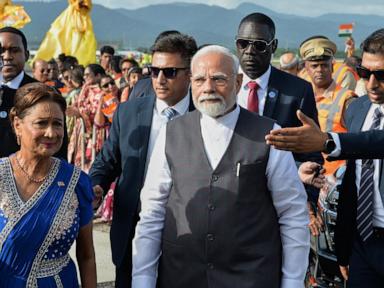

During his first official two-day visit to Trinidad and Tobago, Indian Prime Minister Narendra Modi pledged continued trade and investment between the two nations. Modi addressed the nation's parliament on Friday, emphasizing the importance of collaboration to ensure the Global South has a voice on the world stage. "It's time for us to work together to give the global south its rightful seat at the table," Modi stated, adding, "For us there are no limits to our cooperation with you".
The visit is expected to enhance investment in several sectors, including energy, health, and security. Modi expressed his optimism about working with Trinidad and Tobago to develop digital artificial intelligence tools and improve agriculture, noting the potential for growth in trade while keeping "human development at the center".
In response to Modi's pledges, Trinidad and Tobago's Prime Minister, Kamla Persad-Bissessar, announced several investments in medical, energy, and technological infrastructure. She thanked Modi and stated that the visit signifies more than just diplomacy, but "marks a new dawn". Persad-Bissessar added, "India, and Trinidad and Tobago, will now work as strategic partners". According to Persad-Bissessar, the two countries are also working to renew bilateral trade and investment agreements, with Trinidad and Tobago planning to increase exports to India.
Modi also drew attention to the historical ties between the two countries, describing them as "a powerful symbol" of trust and fraternity. He observed that both nations "rose from the shadows of colonial rule to write our own story," and that "The legacy of shared heritage and mutual respect continues to guide our partnership".
It is worth noting that over 35% of Trinidad and Tobago's 1.4 million residents are of East Indian descent, tracing their origins to indentured workers who arrived from India during the colonial period. While Modi received a warm reception from the Hindu population, some members of the Muslim community voiced criticism. Approximately 18% of the country's population identifies as Hindu, while 5% identifies as Muslim.